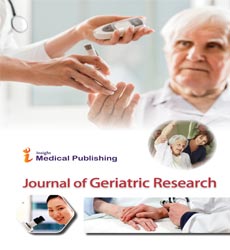A Brief Study on Geriatric Medicine
Shruti Zaveri*
Department of Surgery, The Mount Sinai Hospital, New York, USA
- *Corresponding Author:
- Shruti Zaveri Department of Surgery, The Mount Sinai Hospital, New York, USA, Email: shruti.zaveri@mountsinai.org
Received : December 01, 2021; Accepted : December 15, 2021; Published : December 22, 2021
Geriatrics, or geriatric medicine, is a specialty focused on the health care of the elderly. Its goal is to promote health through the prevention and treatment of diseases and disabilities in older adults. There is no set age at which patients can be cared for by a geriatrician or doctor of geriatrics, a doctor who specializes in the care of the elderly. Rather, this decision is determined by the individual needs of the patient and the availability of a specialist. It is important to note the difference between geriatrics, the nursing of the elderly, and gerontology, which is the study of the aging process itself. However, geriatrics is sometimes referred to as medical gerontology. Geriatrics, which treats the elderly, is a very important specialty, as most medical care is dedicated to people over the age of 65. Certain problems in the elderly include lack of exercise and instability due to energy weakness and loss, the eyes and ears play a role, and weakening of the immune system often leads to more illness. All of these conditions can be exacerbated by mental health problems such as: B. Decreased intellectual activity, decreased memory, depression. This prevents the patient from taking action to improve his or her condition. However, the effects of aging can be significantly reduced with proper care. And the greatest improvement often comes when the patient is persuaded to become more physically, mentally and socially active.
Aging (ie, pure aging) refers to the inevitable, irreversible decline in organ function that occurs over time even in the absence of injury, illness, environmental risks, or poor lifestyle choices (eg, unhealthy diet, lack of exercise, substance abuse).Initially, the changes in organ function (see table Selected Physiologic Age Related Changes) do not affect baseline function; the first manifestations are a reduced capacity of each organ to maintain homeostasis under stress (eg, illness, injury).The cardiovascular, renal, and central nervous systems are usually the most vulnerable (the weakest links). Diseases interact with pure aging effects to cause geriatric specific complications (now referred to as geriatric syndromes), particularly in the weaklink systems— even when those organs are not the primary ones affected by a disease. Typical examples are delirium complicating pneumonia or urinary tract infections and the falls, dizziness, syncope, urinary incontinence, and weight loss that often accompany many minor illnesses in older adults. Aging organs are also more susceptible to injury; eg, intracranial hemorrhage is more common and is triggered by less clinically important injury in older adults.
Geriatrics often describes things related to the medical care of the elderly. B. Geriatric hospital. When used outside the context of health care, it has the sensation of being "weak" or "aged". Using it for someone or something less old, like a group of middleaged people who call a weekly cocktail gathering a "geriatric club," can be humorous. But if you call your grandparents' golf friends "Geriatrics Clubs," they're probably offended. The Geriatric evaluation is a multi-dimensional and multidisciplinary assessment that rated the functioning of an elderly person, physical health, knowledge and mental health, as well as socio environmental circumstances, is generally initiated when the doctor identifies a potential problem. It generally produces a more complete and relevant list of medical problems, functional problems, and psychosocial problems. Well-validated assessment tools and tools to assess activities of daily living, hearing, urinary and fecal continence, balance and cognition are an important part of elderly care. Evaluation. Due to the demands of busy clinical practice, most geriatric assessments are less comprehensive and more problem-oriented. If multiple concerns exist, the use of an "ongoing" review across multiple visits should be considered.
Open Access Journals
- Aquaculture & Veterinary Science
- Chemistry & Chemical Sciences
- Clinical Sciences
- Engineering
- General Science
- Genetics & Molecular Biology
- Health Care & Nursing
- Immunology & Microbiology
- Materials Science
- Mathematics & Physics
- Medical Sciences
- Neurology & Psychiatry
- Oncology & Cancer Science
- Pharmaceutical Sciences
